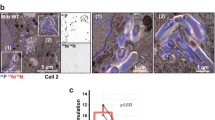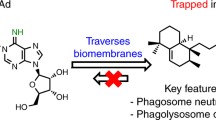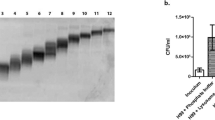Abstract
THE non-ionic surface-active agent ‘Triton WR-1339’ retards the development of experimental tuberculosis when injected into mice; furthermore, bacterial multiplication is slowed in peritoneal macrophages isolated from rabbits and guinea-pigs previously treated with this substance and infected in tissue culture with Mycobacterium tuberculosis. The chemically related agent ‘Macrocyclon’, which is less toxic than ‘WR-1339’ and can be used directly in tissue culture, is as effective as ‘WR-1339’ in the living mouse and is also active when added to mouse peritoneal macrophages before or after intracellular infection1–3. Dextran, on the other hand, accelerates the intracellular growth of tubercle bacilli when added to similar macrophage cultures3. These substances are thought to act on the cell rather than the bacterium1,3; because they probably accumulate in the macrophage lysosomes3 it seemed logical to examine the possible role of these organelles in tuberculous infection. In particular we wished to know whether any of the constituents of the detergent-containing and dextran-containing lysosomes would show inhibitory or other effects on the bacilli cultured in vitro, in the absence of macrophages.
This is a preview of subscription content, access via your institution
Access options
Subscribe to this journal
Receive 51 print issues and online access
$199.00 per year
only $3.90 per issue
Buy this article
- Purchase on Springer Link
- Instant access to full article PDF
Prices may be subject to local taxes which are calculated during checkout
Similar content being viewed by others
References
Cornforth, J. W., Hart, P. D'Arcy, Nicholls, G. A., Rees, R. J. W., and Stock, J. A., Brit. J. Pharmacol., 10, 73 (1955).
Mackaness, G. B., Amer. Rev. Tuberc. Pulm. Dis., 69, 690 (1954).
Hart, P. D'Arcy, Science, 162, 686 (1968).
Wattiaux, R., Wibo, M., and Baudhuin, P., in Lysosomes (edit. by de Reuck, A. V. S., and Cameron, M. P.), 176 (Ciba Found. Symp., 1963).
Trouet, A., Arch. Intern. Physiol. Biochim., 72, 698 (1964).
Thinès-Sempoux, D., thesis, Univ. Catholique de Louvain (1968).
Wattiaux, R., Etude Expérimentale de la Surcharge des Lysosomes (J. Duculot, Gembloux, Belgium, 1966).
Hart, P. D'Arcy, and Rees, R. J. W., Brit. J. Exp. Pathol., 41, 414 (1960).
Mego, J. L., and McQueen, J. D., J. Cell Biol., 35, 176A (1967).
Smeesters, C., thesis, Univ. Catholique de Louvain (1968).
Scanu, A., and Oriente, P., J. Exp. Med., 113, 735 (1961).
Scanu, A., Oriente, P., Szajewski, J. M., McCormack, L. J., and Page, I. H., J. Exp. Med., 114, 279 (1961).
Brown, C. A., Draper, P., and Hart, P. D'Arcy, Nature, 221, 658 (1969).
Author information
Authors and Affiliations
Rights and permissions
About this article
Cite this article
HART, P., GORDON, A. & JACQUES, P. Suggested Role of Lysosomal Lipid in the Contrasting Effects of ‘Triton WR-1339’ and Dextran on Tuberculous Infection. Nature 222, 672–673 (1969). https://doi.org/10.1038/222672a0
Received:
Revised:
Issue Date:
DOI: https://doi.org/10.1038/222672a0
Comments
By submitting a comment you agree to abide by our Terms and Community Guidelines. If you find something abusive or that does not comply with our terms or guidelines please flag it as inappropriate.



